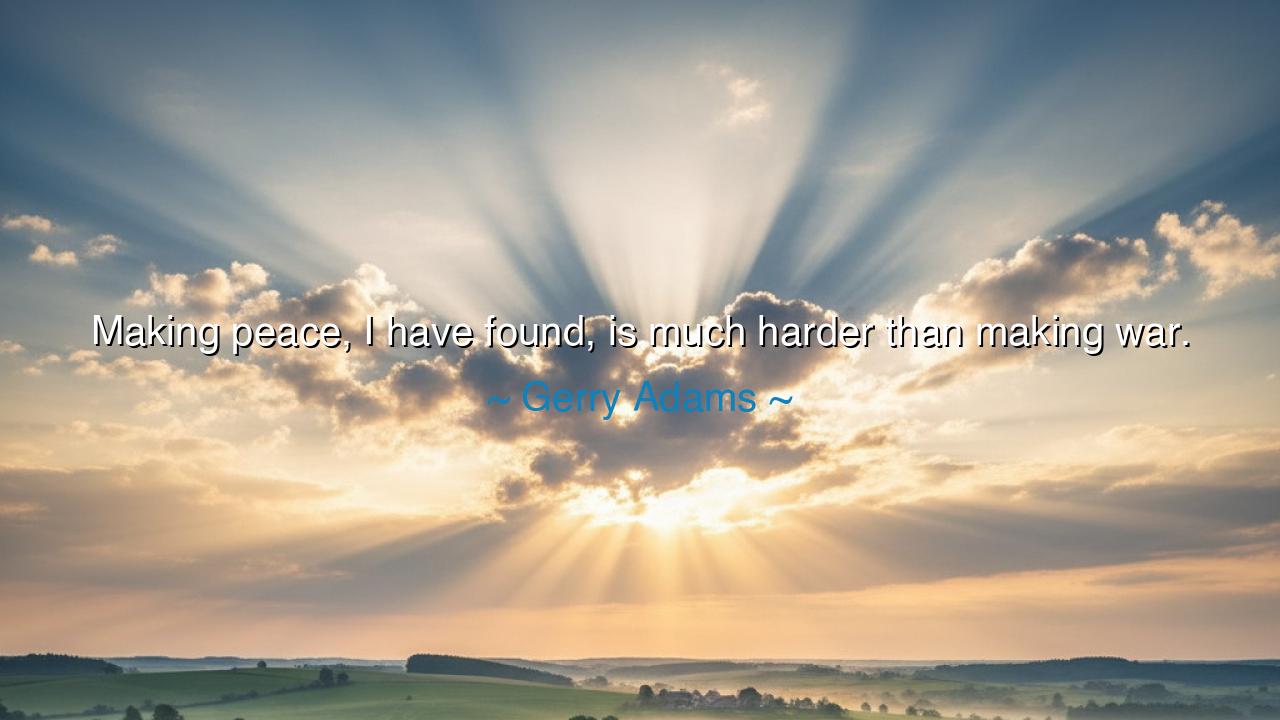
Making peace, I have found, is much harder than making war.






Hear the hard-won words of Gerry Adams, who declared with the weight of lived struggle: “Making peace, I have found, is much harder than making war.” These words arise not from theory, but from the fiery crucible of conflict, from the streets of Northern Ireland where for generations the sword clashed against the shield, and neighbors became enemies. In them lies a timeless truth: it is far easier to destroy than to build, far easier to unleash the passions of anger than to guide the quiet labor of reconciliation.
For what is war but the eruption of human fury? It takes but a spark—a grievance, a wound, an insult—for the fire to spread. Armies can be raised, weapons forged, and passions inflamed with chants of vengeance. Yet peace, that delicate flower, requires patience, humility, and compromise. It demands that men who once lifted weapons against one another now extend open hands. This is the greater labor, for it asks not only the sacrifice of blood, but the sacrifice of pride.
Consider the long tale of the Peloponnesian War, where Athens and Sparta locked themselves in decades of destruction. Thucydides himself remarked that hatred fueled by war was easier to kindle than harmony afterward. The walls of Athens could be rebuilt, but the broken trust between city-states endured for generations. Here we see the truth of Adams’s words: the rebuilding of bridges demands far more strength than their burning.
Gerry Adams himself was a figure woven into this very paradox. Once a man deeply tied to conflict, he later became a voice for dialogue, guiding his people toward the Good Friday Agreement. Yet he knew the price: suspicion from his own allies, mistrust from his former foes, the endless negotiations where every word was weighed like gold. To march into battle may rouse cheers, but to sit across the table from enemies and speak of peace—this is the true trial of the soul.
O seekers of wisdom, understand: peace is not the absence of sound, nor the silence of arms—it is the forging of a new reality where old wounds can breathe and heal. And this requires more than courage in battle; it requires courage in humility, to forgive, to admit wrong, to walk forward when the weight of history drags one back. The sword is heavy, but the olive branch is heavier still, for it carries the burden of tomorrow.
And yet, though harder, peace is the greater glory. The conqueror may be remembered for a season, but the peacemaker is remembered for generations. Think of Mandela, who walked free from prison not with vengeance but with reconciliation on his lips. Think of Lincoln, who sought healing for a torn America even as death shadowed him. Their victories were not won on battlefields, but in the hearts of men. These triumphs, though harder, shine brighter than any conquest.
Therefore, let this teaching be inscribed upon your hearts: when anger stirs, remember that any man can wage war, but only the truly strong can build peace. In your family, in your work, in your community, resist the easy path of conflict. Instead, labor for understanding, even when it feels impossible. Listen before you speak, forgive before you strike, and sow patience where bitterness once grew. For though the making of peace is harder, it is the only path that leads to life.
Thus, the words of Gerry Adams resound across time: war may be swift, but peace is eternal. Seek it, though the road is long and the labor heavy, for in its harvest lies the true triumph of the human spirit.






CHcao hieu
Gerry Adams’ perspective on peace being harder than war makes a lot of sense. While war is destructive, peace requires rebuilding, reconciliation, and a commitment to understanding. What do you think makes peace so challenging? Is it the emotional and historical baggage that people carry, or is it simply the process of convincing all parties that peace is a better option than continued conflict?
HHuy
This quote by Gerry Adams made me think about the many peace negotiations that have failed over time. It’s true that peace often feels like a longer, more difficult road to travel than war. But what’s the real barrier to making peace? Is it the unwillingness of some parties to let go of past grievances, or is it a matter of negotiating the right terms? Can peace ever be achieved without both sides truly wanting it?
ソグハイ ソン グェン
It’s sobering to hear Gerry Adams say that making peace is harder than making war. Peace seems like something we all want, but it often requires so much compromise and the willingness to heal deep wounds. Why is it that some conflicts seem to perpetuate themselves? Is the difficulty of making peace more about the emotional baggage and history than the process itself? Can true peace ever be easy?
LTTruc Lai Thanh
I can’t help but agree with Gerry Adams—making peace seems so much harder than making war. War often feels like a swift, though destructive, solution, whereas peace requires building trust, overcoming resentment, and finding common ground. What do you think? Can we ever achieve true peace without first understanding and accepting the underlying reasons for conflict? Does making peace require more than just ending hostilities?
NDNgoc Do
Adams’ statement about the difficulty of making peace resonates deeply with me. It’s easy to think of peace as the natural end to conflict, but it’s clear that achieving lasting peace requires effort from all sides. How much of this difficulty is tied to the human condition? Are we inherently more prone to conflict than to cooperation, or is the process of making peace simply more complex?